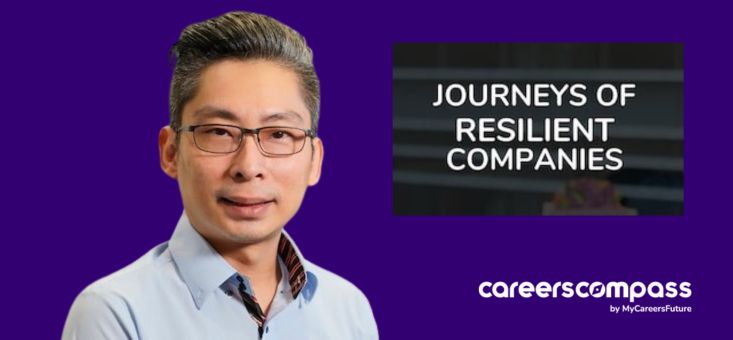Soverus Private Limited, set up in 2008, is a subsidiary of the listed group Secura. Soverus provides security guarding, security systems, security consultancy, data analytics, cybersecurity and private investigation. 44-year-old Kelvin Goh, now the Managing Director of Soverus Private Ltd, joined the company in 2013 as a Senior Business Development Manager and rose quickly through the ranks. The National University of Singapore’s electrical engineering graduate has been in the security business for the past 15 years and knows that the future of security business must anchor on technology for the business to thrive.
Soverus is one of the early trailblazers in the industry when it set up an Integrated Command Centre as part of its security solutions. From an initial headcount of 100 to over 800 currently, the company actively looked at ways to use technology effectively.
“We made a very conscious decision to say that we wanted to do monitoring services. As far back as 2016, we realised that depending on manpower isn’t the way to go. So that’s when we started experimenting and toying with the idea that some sites can be made ‘man-less’.”
Kelvin looked to other countries, such as China where facial recognition techniques are advanced, and which could be adapted to Singapore.
Manpower challenges
The COVID-19 pandemic surfaced many challenges for the firm. In April 2020, when the circuit breaker came into force, there were questions about how many of the Malaysian staff (which made up 40% of his headcount) would stay in their jobs and where to house them. Kelvin managed to house them and subsequently provided long-term solutions as the pandemic enters its third year. “It was an operational nightmare because I only had about half the Malaysian workforce remain in Singapore and the other half left Singapore.”
Another manpower challenge emerged during the Omicron wave. On any given day, Kelvin had 20 of his manpower on medical leave or tested ART-positive. Those who were off were called back or he drew on every possible reserve, but still came up short.
While the pandemic surprisingly triggered new entrants into the security sector, these were mostly from people who joined on a part-time or on an ad hoc basis while they were looking for other opportunities. Kelvin reminds us of the challenges facing the sector. “To be 50 years old in our sector is considered young. And there is a study about what the future looks like in 2030 which says that 50% of the current security workforce will reach retirement age. So, we are talking about 50% of my manpower gone in 2030 – which is only 8 years away.” For Kelvin, these statistics reinforced his belief in the use of technology by security firms to complement manpower requirements.
Man-less security solutions and Workforce Singapore’s role
In 2015, the company shifted its approach to guarding services and Kelvin explains what his thinking was. “I wanted to replace security officers from places like industrial sites during the night shifts and put the people on these sites to better use during the day. So, we have technology at work during the night, monitored by a Command Centre that runs 24/7. Responses will also be done by the Command Centre.”
For every client, a Threat Vulnerability Risk Assessment is first done, after which Soverus will assess and develop a Security Protection Plan, which may comprise manpower and various technologies ranging from fence defence, intrusion detection systems, cameras, and card access controls or even biometric access controls. In fact, Soverus was one of the first companies to build an expansive Command Centre at its Alexandra Terrace Office.
To meet manpower and industry challenges, Workforce Singapore (WSG) and Soverus worked together closely. Kelvin tapped on the Security Productivity Initiative and Job Redesign Grant from WSG and implemented various job redesign projects across different sites to make security officer jobs easier, safer and smarter, such as leveraging technology to reduce physical patrolling.
In addition, guided by the Security Industry Transformation Map, the security industry has been encouraged to innovate, transform and deliver more productive solutions that integrate manpower, technology and processes. Soverus has come on board the Career Conversion Programme (CCP) for Security Officers to reskill their security officers, which allowed Soverus to draw up training plans specific to the company’s needs and incorporate on-the-job training on the use of technology in their reskilling efforts.
To Kelvin, a lot more goes into using technology. Training is a vital component. “What a lot of people fail to see is that you can implement the best technology, but if the person using the technology doesn’t know how to use it, then it’s not going to be very effective. It’s just going to be a white elephant.”
The future: Robots and more
In 2021, Soverus started to deploy robots for night patrols. Behind the deployment was lots of preparatory work as Kelvin points out. “The training for the use of the robot is not so straightforward. It’s not only about using the robot and controlling it, but it’s also about the video analytics part of it, you have to be trained to look at the data and then decide whether or not to send a human there to intervene, should the need arise.”
Clearly, the future is here for companies like Soverus. Kelvin talks of drones, ‘man-less’ patrolling, robots, and fence intrusion devices – the list goes on. He is on an urgent mission to get Soverus staff equipped with the new skills to be future-ready.
FACTBOX
Career Conversion Programme (CCP) for Security Officers (SOs)
|
The Career Conversion Programme (CCP) for Security Officers (SOs) aims to support security agencies to redesign and reskill SOs’ job roles to meet evolving business needs and operational requirements. Participating companies are required to develop training plans of 1 to 2 months which will comprise both Classroom Training and On-the-Job Training (OJT), to equip SOs with the new skillsets to perform the redesigned jobs. Some of the skillsets may include:
Interested companies may contact our programme managers, Security Industry Institute SIIEvents@tp.edu.sg or Union of Security Employees at use@ntuc.org.sg for more information. |















